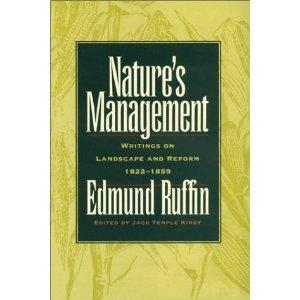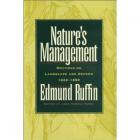Ruffin, Edmund. Nature’s Management: Writings on Landscape and Reform, 1822–1859. Edited by Jack Temple Kirby. Athens: University of Georgia Press, 2002.
Nature’s Management is a collection of early nineteenth century agricultural writings by Edmund Ruffin, topically arranged to highlight Virginia’s fence enclosure laws, municipal public health measures to combat malaria, wetlands drainage and reclamation, and observations of the geology, botany, and culture of Virginia and the Carolinas. From this eclectic mixture of subject matter, an enriched view of the intellectual context of antebellum southern plantation agriculture is certainly made possible. Ruffin infused his pages with frank discussions of the political, economic, and moral implications of taking actions to render one’s property more capable of producing food. The modern reader recognizes not only a notion of environmental sustainability issuing from these essays, but also a sense of nature’s plasticity. Ruffin consistently urged his readers to nurture, to restore, and even to reshape their lands, in order to promote agricultural improvement in the interest of long-term prosperity. Even though Ruffin understood and accepted Malthusian laws of population and subsistence as ultimately valid, he insisted that a country’s ruin and destitution could be hastened needlessly through the narrow pursuit of individual self-interest. Soil exhaustion was Ruffin’s bete noire, and landowners who pursued personal wealth at the expense of general prosperity were to be held accountable. (Text adapted from an H-Net review by David I. Spanagel.)



